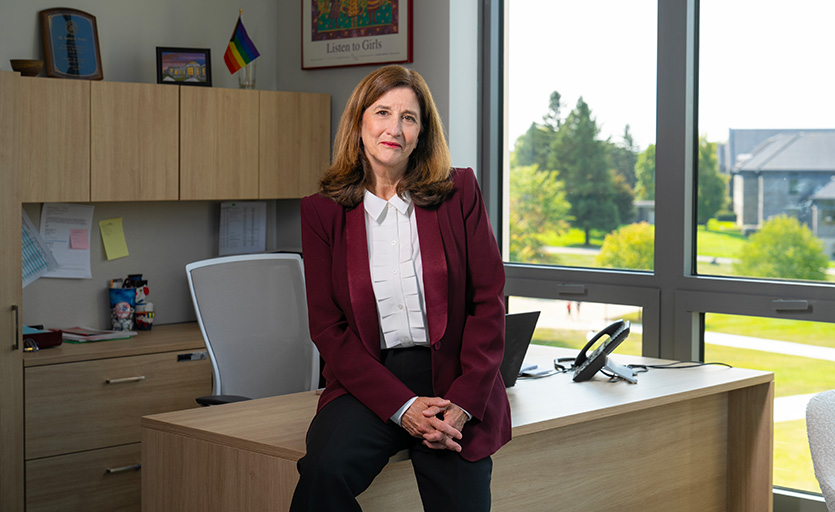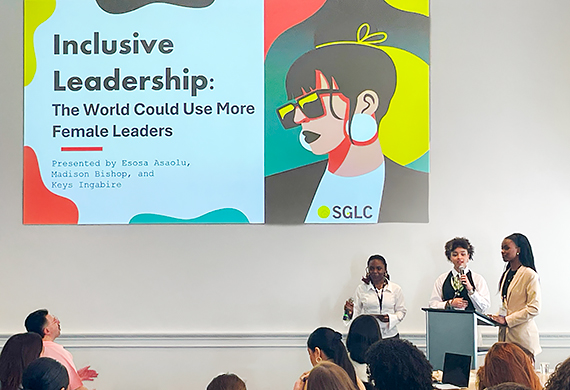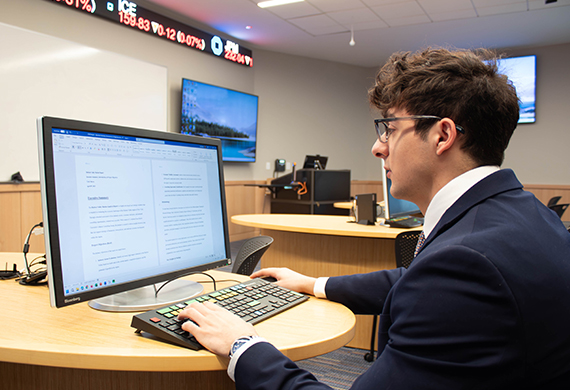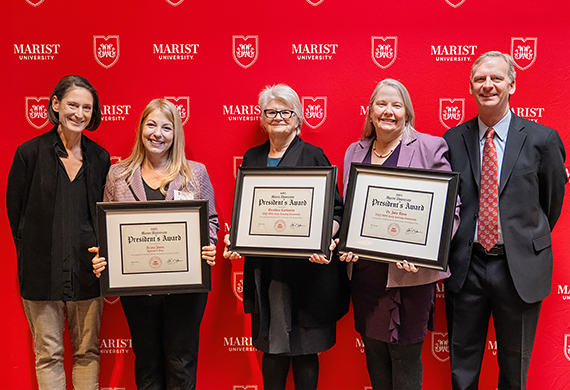Office Hours With Dr. Deborah Gatins, Dean of the School of Social & Behavioral Sciences

Office Hours is a recurring segment where the Inside Marist team sparks conversations with key members of the campus community. Find out more about the inner workings of the College, gain fresh perspectives, and celebrate the invaluable contributions of those who make Marist the vibrant community that it is.
In this segment, Inside Marist’s Michelle Eggink interviews Dr. Deborah Gatins, Dean of The School of Social and Behavioral Sciences. Dr. Gatins is a licensed psychologist with a B.A. from Vassar College and a Ph.D. in Clinical Psychology from the University of Miami, Florida. She has been a full-time faculty member at Marist College since 1999, specializing in adolescent development, with publications on adolescent substance abuse and divorce, and contributions to educational media on adolescent health.
Q What’s something most people don’t know about you?
A In high school and college, I was a lead singer in rock and roll, jazz, and wedding bands.
When not at work, I enjoy running and reading. I started a neighborhood book club that will celebrate 20 years in November. Recently, I became a grandmother and greatly enjoy any time I can get with my grandson.
Dean Gatins holding her old band t-shirt. Photo by Carlo de Jesus/Marist College.
Q How would you describe your faculty?
A Our faculty has great energy and is deeply student-focused. For example, over a decade ago, they pioneered Creating an Inclusive Community (CIC), a grassroots effort that engaged almost half of our faculty in thoughtful discussions about classroom practices that would support creating respectful and inclusive environments. They shared readings and had courageous conversations about sensitive classroom interactions and were practicing "DEI efforts" before the term existed. They wanted all student perspectives and voices to be heard.
The faculty is intentional in creating experiential curricula. They work to bring material to life, support student growth, and take students to regional and national conferences while collaborating on research. I’m continually amazed by their dedication and the innovative ways they support and engage our students.
Q Your school seems to really nurture the “helpers” of society. Can you discuss what sets your students and your school apart from other colleges and universities?
A Our students come with a clear desire to help others, so we ensure they gain both theoretical knowledge and hands-on training to become effective human service professionals. All our programs require internships, providing real-world experience and helping our students make sure their chosen fields are the right fit for them.
It’s somewhat unique to have education, crime and justice studies, social work, and psychology all housed under one roof, but our students are able to explore and mix disciplines more freely, whether that's through double majors, minors in social justice or cognitive science, or simply taking courses across different fields. It’s easier for them to try things out and distinguish the nuances between professions.
Dean Gatins with a view of the new Dyson Center atrium. Photo by Carlo de Jesus/Marist College.
Q What new Dyson Center features are you excited about for the School of Social & Behavioral Sciences?
A The state-of-the-art facilities, including active learning classrooms and specialized spaces, will significantly enhance teaching, research, and experiential learning. The building offers inviting spaces like huddle rooms, an open atrium, and a Saxbys cafe, creating a vibrant environment that will spark spontaneous and coordinated collaborations for students and faculty.
Not only am I excited about the building’s impact on students of course, but also on our faculty, who have been an integral part of the planning and design of the new Dyson for years. The building’s incredible new resources, like the teaching methods labs, psychology labs, mock courtroom, crime and justice studies lab, and counseling/school psychology suite, have already attracted even more talented faculty. I can’t wait to see the remarkable undergraduate and graduate curriculum that will unfold in these cutting-edge spaces, taking our school to the next level.
See Dean Gatins helping knock down the old Dyson building.
Q Can you talk to me about your journey into academia?
A My journey into academia was shaped by growing up as the eldest of four in a first-generation Irish Catholic family with a mother who firmly believed education was the key to "getting ahead." Thanks to my mom's savvy ability to obtain a job at Vassar, I attended college with tuition reimbursement benefits, majoring in psychology, completing the requirements to teach Spanish to 7th - 12th graders, and studying abroad in Spain.
After earning a PhD in clinical psychology, I worked in residential treatment settings for 10 years, at one point directing an inpatient unit for adolescent substance abusers. However, motherhood nudged me toward part-time teaching and private practice. Eventually, I earned a visiting assistant professor position at Marist and had success securing a tenure-track position when one became available. I've always enjoyed leadership roles and soon found myself chairing the psychology department, and then became the first Assistant Dean for the School of Social and Behavioral Sciences. In 2017, I became the Dean.
Q How would you describe your leadership style?
A I aim to be fair but firm, holding people accountable while offering strong support. As a woman in leadership, I stand on the shoulders of women who came before me and I believe in the power of being genuine and confident. My advice to women is to stay true to yourself and to your goals despite external biases and expectations. It’s a myth that you can’t have it all or that you need to be a certain way as a female leader—pursue what you love and find your balance. Progress comes with its challenges, but remember to trust yourself and go for what you want. You can do it.
Q If you could have dinner with anyone, living or not, who would it be?
A My best friend Marylu who passed away. We met in graduate school pursuing our doctorates in psychology. We wouldn’t need to go anywhere fancy for dinner; we’d probably just get takeout and talk.
Q What’s one piece of advice you have for students in the School of Social & Behaviorial Sciences?
A Stay on top of your schoolwork and don't fall behind. Enjoy college life too. This should be the beginning of learning how to achieve a good "work-life balance."
This is the second installment in a series of interviews with the deans of Marist’s six academic schools. We sat down with campus leadership to provide an inside look at the individuals guiding our institution's academic vision.




